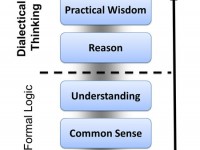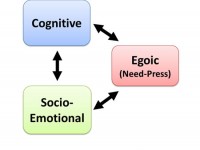In this course, students work with members of a team of their choice in order to better manage complexity with the aid of holistic and systemic, “dialectical”, thinking. Focusing on a central team task, they model for team members how to deepen collaboration and partnership in the team by closely listening to others’ task and interpersonal issues. In paying close attention to team discourse, they learn how to facilitate the untrammelled flow of ideas and proposals for solving both well-defined and heretofore ill-defined team problems. Helped by discussions in the study cohort, participants develop pertinent dialectical thinking exercises for their team, both to promote members’ interpersonal functioning and to reflectively deepen their approach to team tasks. They also help team members pay attention to the relationship of their own team to other teams with which they collaborate or compete in the organization. Students obtain a course certificate by submitting to the instructor a written free-form report (about 10 pp.) on how, under their guidance, the team has developed a greater aptitude for defining and pursuing topics and goals crucial for the team’s success. In the report, they spell out details of the results of their interventions during the duration of... Read More...
Tag: Cognitive Dimension
Case Study II: CDF Dimensions in their Interrelationship within a Client’s Unitary Consciousness
This program serves the sole purpose of deepening practical know-how of CDF by bringing together all of its three dimensions. Consequently, it presupposes both a social-emotional and cognitive case study as well as the ability to evaluate and give feedback on the outcome of the Need/Press Questionnaire. The program offers students the opportunity to show themselves and others that they have not only mastered “developmental theory”, but also know how to use it in practice. Writing a second case study involves: Completing a 1-hr social-emotional and 1-hr cognitive interview with a client other than the person engaged in Case Study I (a+b) Transcribing both interviews into English for discussion in the study cohort Evaluating the outcome of the psychological Need/Press Questionnaire Selecting from the social-emotional interview 15, from the cognitive interview 30 short fragments that appear to be structurally relevant for determining developmental profile Presenting a coding sheet of these fragments for each transcribed interview, to be evaluated by the cohort together with the instructor Submitting all materials required for written case study to the Director of Education Attending a feedback session with the Director of Education Giving full feedback to the client, both for self-insight and coaching Read... Read More...
Review of De Visch’s “Mind(s) Creating Value”
J. De Visch's Leadership-- Mind(s) Creating Value J. De Visch's Leadership-- Mind(s) Creating Value Jan DeVisch continues to plow the depth of dialectical thinking to restructure and refine corporate conversations. This writer is excellently prepared for the task, since his professional career has long been focused on issues of global concern both for and regarding large organizations. Read More...
Constructive Developmental Framework (CDF) – Ungekürzter Wikipedia-Artikel
Von Bruno Frischherz - Das Constructive Developmental Framework (CDF) ist eine psychologische Entwicklungstheorie und das entsprechende Assessmentinstrument, das auf empirischer Forschung beruht. Der CDF-Methodologie liegt die Annahme zugrunde, dass jedes Individuum sich aktiv eine eigene “Welt” konstruiert, die von anderen Weltmodellen verschieden und lebenslang im Entstehen ist. Die CDF-Methodologie umfasst drei Assessmentinstrumente, je eines für die sozial-emotionale und kognitive Entwicklung einer Person, und eines für das psychologische Profil. Die CDF-Methodologie kommt überall dort zur Anwendung, wo es darum geht, Erwachsene bei ihrer lebenslangen Entwicklung zu unterstützen. Die Methodologie wird am Interdevelopmental Institute (IDM) in verschiedenen Programmen unterrichtet. Die empirische Grundlage der Methodologie gründet in der Forschung, die vor 40 Jahren an der Kohlbergschule begann. Diese Methodologie wurde seit 1998 durch Otto Laske durch das dialektische Denken der Frankfurter Schule und Hegel’s Philosophie erweitert. Diese Erweiterung zeigt sich vor allem darin, dass CDF strikt zwischen sozial-emotionaler und kognitiver Entwicklung unterscheidet und beide empirisch in Beziehung zueinander setzt. Download: Frischherz_2012_Constructive_Developmental_Framework_CDF_Wikipedia Read More...
What can IDM offer the Integral movement?
This article explores how IDM's teachings relate to "Integral" and specifically Wilber's "AQAL" model. It further argues that an understanding of dialectical thinking as taught at IDM enables the learner to develop a critical perspective on Integral's core doctrines. What Can IDM Offer the Integral Movement Read More...

